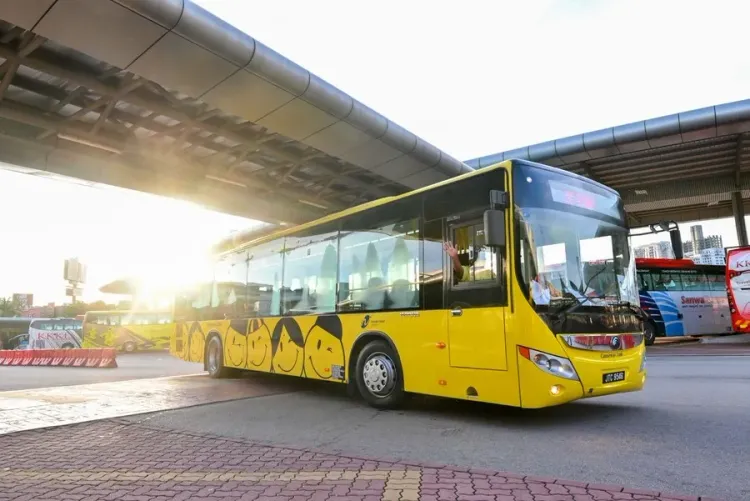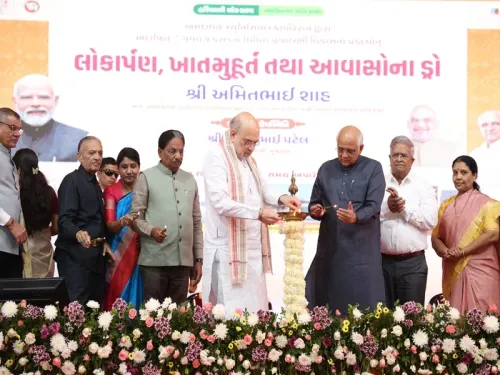Singapore Seeks Proposals for Autonomous Bus Pilot Program

Synopsis
Key Takeaways
- Singapore's LTA is inviting proposals for autonomous bus trials.
- The pilot program aims to test smaller buses on two routes.
- Safety operators will initially be on board during operations.
- Successful trials could expand the program with more buses and routes.
- Walking and cycling infrastructure improvements are also underway.
Singapore, Jan 27 (NationPress) The Land Transport Authority (LTA) of Singapore has called upon industry participants to present proposals for a pilot scheme aimed at testing autonomous public buses, as announced on Monday.
The invitation for proposals will close in the second quarter of 2025, with an objective to initiate a three-year trial featuring smaller autonomous buses on two designated routes starting mid-2026.
The pilot will commence with six buses, each accommodating at least 16 passengers, operating on routes selected for their simple and short configurations.
The program is designed to evaluate the technical viability of autonomous vehicle technology for public transport services while gathering insights on the operational management of autonomous buses at both service and fleet levels, as stated by the LTA.
During the initial phase, the buses will have bus captains on board as safety operators, ensuring operational smoothness and compliance with safety protocols including secure pick-ups and drop-offs at designated stops. Passengers will also be required to stay seated and use seatbelts. A customer service officer may assist commuters needing help.
Once the buses demonstrate reliable self-driving and remote operation capabilities, the captains will be substituted with remote safety operators. The LTA will conduct real-time monitoring of the buses throughout the trial to evaluate their performance and adherence to regulations.
If successful, the LTA may broaden the program by acquiring up to 14 additional buses and incorporating two more routes into the trial. A contract for the pilot is anticipated to be awarded by the end of 2025, as reported by Xinhua news agency.
Earlier this month, Singapore announced plans to enhance 10 streets across the island by 2026 to improve walking and cycling experiences, particularly for seniors and young children.
Initiatives for these 'Friendly Streets' will begin progressively in the first half of 2025, with a completion target of 2026, as stated by Senior Minister of State for Transport Amy Khor.
By 2030, every town in Singapore is expected to feature at least one 'Friendly Street', she added.
These streets will be located in residential zones with high pedestrian traffic and proximity to essential amenities such as markets, hawker centres, community clubs, schools, and MRT stations. These neighborhoods often have a higher density of seniors or young families, according to a statement from the LTA.
Planned pedestrian-friendly improvements include reduced speed limits, barrier-free pedestrian crossings prioritizing walkers, road markings and treatments aimed at calming traffic and encouraging courteous driving, along with wider and more accessible footpaths where possible.
The specific locations and features of these streets were established in collaboration with local communities following consultations with stakeholders and residents, as reported by Xinhua news agency.
"Construction works will gradually commence from the first half of 2025 and conclude in 2026. Whenever feasible, works will be carried out alongside other nearby projects to lessen inconveniences to residents. Upon completion, residents can anticipate more barrier-free crossings, traffic-calming measures such as road humps, green road markings to prompt drivers to reduce speed before crossings, and pedestrian-friendly zones identified with the distinctive Friendly Streets icon," read a statement from the Singapore's LTA.
Initially launched as a pilot in 2023, the 'Friendly Streets' initiative started with five streets. Four have been completed, and one more is expected to finish by March this year. The LTA received positive feedback from residents, with nine out of ten respondents indicating an improvement in their walking and cycling experiences.










